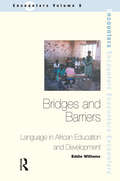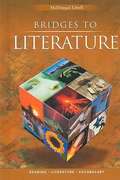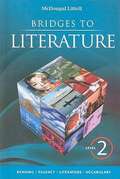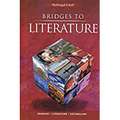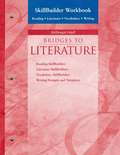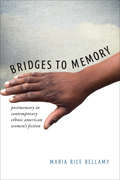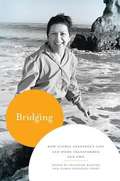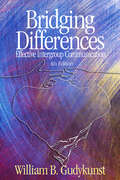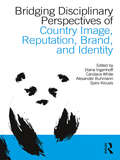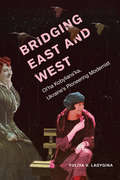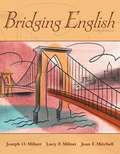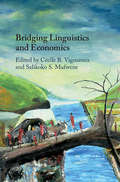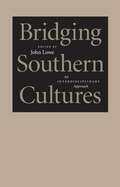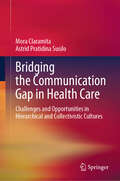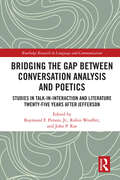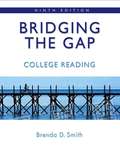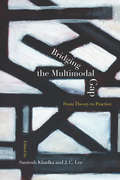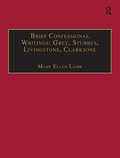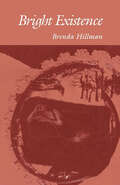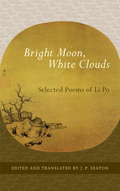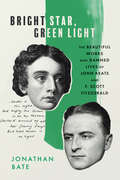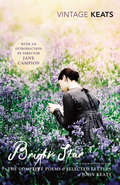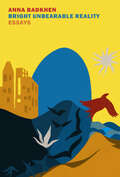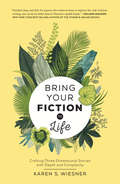- Table View
- List View
Bridges and Barriers: Language in African Education and Development
by Eddie WilliamsRecent decades have seen sub-Saharan Africa decline in both economic and human terms. The rich North has responded with a barrage of well-publicized initiatives, from pop concerts to international commitments on debt relief, aid, trade and good governance. Among the complex of factors necessary to sustain economic and human development, education receives little media coverage, although it is crucial. However, education must be effective. This book argues that in 'Anglophone' Africa, education is not effective because of the use of English, rather than children's first languages, both as the medium of instruction, and also as the language in which children are first taught to read. Research is presented from Malawi and Zambia, countries with contrasting language policies, using evidence from tests in English and African languages, small-group discussions and classroom observation. The findings show that English-medium policies in Africa do not give students any advantage in English over first-language policies, while the use of English discriminates against girls and rural children. The book concludes that much education in Africa is a barrier rather than a bridge to learning because of the prevailing language ideology, which has resulted in massive over-estimation of the value of English. While appropriate language policies alone will not solve education and development difficulties in Africa, they do have a positive contribution to make. The evidence presented here suggests they are failing to make that contribution.
Bridges to Literature Level 1
by Jane GreeneA fine collection of Fiction, Non-fiction, Poetry, Drama, Mixed Genres and Reader's choice of Longer Selections for independent reading which will make reading a pleasurable experience to all.
Bridges to Literature [Level 2]
by Jane GreeneSometimes a decision you make or an action you take can't be undone. Like the characters in this unit, you may face a moment that changes your life forever. These works are all fiction--stories created from a writer's imagination.
Bridges to Literature [Level 3]
by Jane GreeneThis Bridges to Literature Level III text contains Fiction, Non-Fiction, Mixed Genres, Drama, Poetry and Reader's Choice.
Bridges to Literature: SkillBuilder Workbook Level 2 (McDougal Littell Language of Literature)
by McDougal-Littell Publishing StaffThis workbook accompanies the Bridges to Literature program and provides additional skills practice in the program's four focus areas: reading comprehension, literature, vocabulary, and writing.
Bridges to Memory: Postmemory in Contemporary Ethnic American Women's Fiction
by Maria Rice BellamyTracing the development of a new genre in contemporary American literature that was engendered in the civil rights, feminist, and ethnic empowerment struggles of the 1960s and 1970s, Bridges to Memory shows how these movements authorized African American and ethnic American women writers to reimagine the traumatic histories that form their ancestral inheritance and define their contemporary identities. Drawing on the concept of postmemory--a paradigm developed to describe the relationship that children of Holocaust survivors have to their parents' traumatic experiences--Maria Bellamy examines narrative representations of this inherited form of trauma in the work of contemporary African American and ethnic American women writers. Focusing on Gayl Jones's Corregidora, Octavia Butler's Kindred, Phyllis Alesia Perry's Stigmata, Cristina García's Dreaming in Cuban, Nora Okja Keller's Comfort Woman, and Edwidge Danticat's The Dew Breaker, Bellamy shows how cultural context determines the ways in which traumatic history is remembered and transmitted to future generations. Taken together, these narratives of postmemory manifest the haunting presence of the past in the present and constitute an archive of textual witness and global relevance that builds cross-cultural understanding and ethical engagement with the suffering of others.
Bridging
by Analouise Keating Gloria González-LópezMore than twenty years after the ground-breaking anthology This Bridge Called My Back called upon feminists to envision new forms of communities and practices, Gloria E. Anzaldúa and AnaLouise Keating have painstakingly assembled a new collection of over eighty original writings that offers a bold new vision of women-of-color consciousness for the twenty-first century. Written by women and men--both "of color" and "white"--this bridge we call home will challenge readers to rethink existing categories and invent new individual and collective identities.
Bridging Differences: Effective Intergroup Communication
by William B. GudykunstThe Fourth Edition of Bridging Differences: Effective Intergroup Communication builds on the strengths of the previous editions and provides state-of-the-art knowledge about intergroup communication. This new edition brings a strong skills-oriented approach to improving communication effectiveness between people from different groups (e.g., cultures, ethnic groups, social classes). Bridging Differences is based on the assumption that the processes operating when we communicate with people from other groups are the same processes operating when we communicate with people from our own groups. Author William B. Gudykunst has written this book from the perspective of "communicating with strangers" and addresses how factors related to our group memberships (e.g., inaccurate and unfavorable stereotypes of members of other cultures and ethnic groups) can cause us to misinterpret the messages we receive from members of those groups. New to the Fourth Edition: Expanded discussions of several topics such as changing intergroup expectations; cultural differences in attribution processes; cultural and ethnic differences in conflict; cultural differences in indirect messages; cultural differences in uncertainty management; empathy; ethnic and cultural identities; face and its relationship to conflict management; intergroup communication effectiveness; intergroup conflict; intergroup biases; negotiating means; perceptual processes; and prejudice New material has been added on civic engagement; community in public life; diversity and community; the content of stereotypes; communication in romantic relationships; cultural differences in effective communication; and theoretical explanations for prejudice Pedagogical features include end-of-chapter study questions, self-assessment questionnaires, open-ended questions to stimulate readers to think about their implicit theories, and written skill exercises to increase students′ skill development Designed for students taking courses in Intercultural Communication or Intergroup Communication, Bridging Differences is also useful for many courses in Cultural Studies, Anthropology, Sociology, and Management.
Bridging Disciplinary Perspectives of Country Image Reputation, Brand, and Identity: Reputation, Brand, and Identity
by Spiro Kiousis Diana Ingenhoff Candace White Alexander BuhmannCountry image and related constructs, such as country reputation, brand, and identity, have been subjects of debate in fields such as marketing, psychology, sociology, communication, and political science. This volume provides an overview of current scholarship, places related research interests across disciplines in a common context, and illustrates connections among the constructs. Discussing how different scholarly perspectives can be applied to answer a broad range of related research questions, this volume aims to contribute to the emergence of a more theoretical, open, and interdisciplinary study of country image, reputation, brand, and identity.
Bridging East and West: Ol’ha Kobylians’ka, Ukraine’s Pioneering Modernist
by Yuliya LadyginaBridging East and West explores the literary evolution of one of Ukraine’s foremost modernist writers, Ol’ha Kobylianska, who was a major contributor in the intellectual debates of her time. Investigating themes of feminism, populism, Nietzscheanism, nationalism, and fascism in her works, this study presents an alternative intellectual genealogy in turn-of-the-century European arts and letters whose implications reach far beyond the field of Ukrainian studies. Rather than repeating various narratives about modernism as a radical response to nineteenth-century bourgeois culture or an aesthetic of fragmentation, this study highlights the fissures and fusions inherent to turn-of-the-century thought. For feminist scholars, Bridging East and West makes accessible a thorough account of a central, yet overlooked, woman writer who served as a model and a contributor within a major cultural tradition. For those working in Victorian studies or comparative fascism and for those interested in Nietzsche and his influence on European intellectuals, Kobylians’ka emerges in this study as an unlikely, but no less active, trailblazer in the social and aesthetic theories that would define European debates about culture, science, and politics in the first half of the twentieth century. For those interested in questions of transnationalism and intersectionality, this study’s discussion of Kobylians’ka’s hybrid cultural identity and philosophical program exemplifies cultural interchange and irreducible complexities of cultural identity.
Bridging English
by Joseph Milner Lucy Milner Joan MitchellBridging English, 5/e brings tomorrow's English teachers the theory and practice they need to be effective in their own classrooms. Comprehensive and thoroughly up to date, this new fifth edition focuses on such new recent developments as the increasing diversity of today's students, with their unique learning styles and needs; the expanding definition of literacy; the mounting pressures of accountability and end-of-course testing; and the challenges and opportunities arising from rapid advances in technology–subjects that the authors tackle to bring the text up to date and in step with what's really happening in today's classrooms.
Bridging Linguistics and Economics
by Salikoko S. Mufwene Cécile B. VigourouxLinguistics has had a significant and evident impact on economics, and vice versa. However, this mutually beneficial relationship has so far remained under-exploited. This rich volume brings together an international range of scholars, to bridge the gap between these two distinct but increasingly interrelated disciplines. It covers areas such as the role of economic factors in the maintenance or loss of languages, the relationship between speakers' language choices and economic practices, the relevance of economic development to the spread of modern communication technology, and the role of language in economic development. It represents a critical call to arms for researchers and students in both fields to engage in better informed ways with the work of the other. By sharing both linguistic and economic ideas, the editors and the other contributors foster a clear dialogue between the two disciplines, which will inform the rapidly emerging field of 'language economics'.
Bridging Southern Cultures: An Interdisciplinary Approach (Southern Literary Studies #1)
by John LoweA panorama of past and contemporary southern society are captured in Bridging Southern Cultures by some of the South's leading historians, anthropologists, literary critics, musicologists, and folklorists. Crossing the chasms of demographics, academic disciplines, art forms, and culture, this exciting collection reaches aspects of southern heritage that previous approaches have long obscured.Virtually every dimension of southern identity receives attention here. William Andrews,Thadious Davis, Sue Bridwell Beckham, Richard Megraw, and Joyce Marie Jackson offer engaging reflections on art, age, race, and gender. Bertram Wyatt-Brown delivers a startling reading of Faulkner, revealing the tangled history of southern modernism. Daniel C. Littlefield, Henry Shapiro, and Charles Reagan Wilson provide important assessments of Africanisms in southern culture, Appalachian studies, and the blessing and burden of southern culture. John Shelton Reed probes the humorous and awkward aspects of the South's midlife crisis. John Lowe shows how the myth of the biracial southern family complicated plantation-school narratives for both white and black writers.Showcasing the thought of preeminent southern intellectuals, Bridging Southern Cultures is a timely assessment of the state of contemporary southern studies.
Bridging the Communication Gap in Health Care: Challenges and Opportunities in Hierarchical and Collectivistic Cultures
by Mora Claramita Astrid Pratidina SusiloThis book discusses how hierarchical and collectivist cultures contribute to the challenges and opportunities in communication in health care. Failures in communication may result in threats to patient safety. The work is structured around the Hofstede theoretical framework, focusing on two of the six domains of culture, namely hierarchy and collectivism. To date, guidelines on communication practices in health care have been primarily based on Western evidence and thus do not satisfy the needs of other cultural contexts. Existing studies have shown that strong hierarchical and collectivist cultures, transnationally, have different communication practices, with shared characteristics between several countries in Asia, Africa, and South America. Furthermore, when people migrate, they bring their communication styles — which reflect their cultural characteristics — to their new host environment. When not well managed, these differences can yield problematic communication gaps affecting patient care. Building on their extensive work focused on healthcare communication in Southeast Asian cultures, the authors propose remedial approaches and discuss future initiatives for practicing doctors, nurses, pharmacists, and other healthcare practitioners who encounter the daily struggle of cultural miscommunication in their clinical practices. They also address the ways in which patients experience hesitancy when communicating with healthcare providers, owing to cultural barriers. The book proposes how healthcare providers might tackle these communication challenges. It is relevant to educators and researchers in medical and health professions education and public health, and for all patients' advocates, who are looking to enhance their communication skills to improve patient care and safety.
Bridging the Gap Between Conversation Analysis and Poetics: Studies in Talk-In-Interaction and Literature Twenty-Five Years after Jefferson (Routledge Research in Language and Communication)
by Robin Wooffitt John P. Rae Raymond F. PersonThis collection extends the conversation beginning with Gail Jefferson’s seminal 1996 article, "On the Poetics of Ordinary Talk," linking the poetics of ordinary talk with the work of poets to bring together critical perspectives on new data from talk-in-interaction and applications of Jefferson’s poetics to literary discourse. Bringing together contributions from Conversation Analysis and literary scholars, the book begins by analyzing the presentation which served as the genesis for Jefferson’s article to highlight the occurrence of poetics in institutional talk. The first section then provides an in-depth examination of case studies from Conversation Analysis which draw on new data from naturally occurring discourse. The second half explores literary poetics as a form of institutional talk emerging from the poetics of ordinary talk, offering new possibilities for interpreting work in classics, biblical studies, folklore studies and contemporary literature. Each chapter engages in a discussion of Jefferson’s article toward reinforcing the relationships between the two disciplines and indicating a way forward for interdisciplinary scholarship. The collection highlights the enduring influence of Jefferson’s poetics to our understanding of language, both talk-in interaction and literary discourse, making this book of particular interest to students and researchers in Conversation Analysis, literary studies, stylistics, and pragmatics.
Bridging the Gap: College Reading (Ninth Edition)
by Brenda D. SmithA guide on how to read at the college level.
Bridging the Multimodal Gap: From Theory to Practice
by Santosh Khadka J. C. LeeBridging the Multimodal Gap addresses multimodality scholarship and its use in the composition classroom. Despite scholars’ interest in their students’ multiple literacies, multimodal composition is far from the norm in most writing classes. Essays explore how multimodality can be implemented in courses and narrow the gap between those who regularly engage in this instruction and those who are still considering its scholarly and pedagogical value. After an introductory section reviewing the theory literature, chapters present research on implementing multimodal composition in diverse contexts. Contributors address starter subjects like using comics, blogs, or multimodal journals; more ambitious topics such as multimodal assignments in online instruction or digital story telling; and complex issues like assessment, transfer, and rhetorical awareness. Bridging the Multimodal Gap translates theory into practice and will encourage teachers, including WPAs, TAs, and contingent faculty, to experiment with multiple modes of communication in their projects. Contributors: Sara P. Alvarez, Steven Alvarez, Michael Baumann, Joel Bloch, Aaron Block, Jessie C. Borgman, Andrew Bourelle, Tiffany Bourelle, Kara Mae Brown, Jennifer J. Buckner, Angela Clark-Oates, Michelle Day, Susan DeRosa, Dànielle Nicole DeVoss, Stephen Ferruci, Layne M. P. Gordon, Bruce Horner, Matthew Irwin, Elizabeth Kleinfeld, Ashanka Kumari, Laura Sceniak Matravers, Jessica S. B. Newman, Mark Pedretti, Adam Perzynski, Breanne Potter, Caitlin E. Ray, Areti Sakellaris, Khirsten L. Scott, Rebecca Thorndike-Breeze, Jon Udelson, Shane A. Wood, Rick Wysocki, Kathleen Blake Yancey
Brief Confessional Writings: Printed Writings 1500–1640: Series I, Part Two, Volume 2 (The Early Modern Englishwoman: A Facsimile Library of Essential Works & Printed Writings, 1500-1640: Series I, Part Two #Vol. 2)
by Mary Ellen LambThe works by the four protestant women authors collected in this volume participate in the ars moriandi (art of dying) tradition which became increasingly powerful over the 16th and 17th centuries. The moment of death was thought to reveal the ’true’ state of the individual’s soul. This volume provides four varying forms of heroic subjectivity offered by middle class and aristocratic women by the act of dying well. In all four cases their heroic deaths also proclaimed and thus helped to define specifically Protestant doctrines. When so few women’s words appeared in print, this ideological function probably represented a primary reason for the recording and publishing of these works.
Bright Existence (Wesleyan Poetry Series)
by Brenda HillmanA celebrated poet's vision of our dynamic universe. The poems in Brenda Hillman's new collection, a companion volume to her recent Death Tratates, offer a dynamic vision of a universe founded on the tensions between light and dark , existence and non-existence, male and female, spirit and matter. Informed in part by Gnostic concepts of the separate soul in search of its divine origins ("spirit held by matter"). This dualistic vision is cast in contemporary terms and seeks resolution of these tensions through acceptance.
Bright Moon, White Clouds: Selected Poems of Li Po
by J. P. Seaton Li PoLi Po (701-762) is considered one of the greatest poets to live during the Tang dynasty--what was considered to be the golden age for Chinese poetry. He was also the first Chinese poet to become well known in the West, and he greatly influenced many American poets during the twentieth century. Calling himself the "God of Wine" and known to his patrons as a "fallen immortal," Li Po wrote with eloquence, vividness, and often playfulness, as he extols the joys of nature, wine, and the life of a wandering recluse. Li Po had a strong social conscience, and he struggled against the hard times of his age. He was inspired by the newly blossoming Zen Buddhism and merged it with the Taoism that he had studied all his life. Though Li Po's love of wine is legendary, the translator, J. P. Seaton, includes poems on a wide range of topics--friendship and love, political criticism, poems written to curry patronage, poems of the spirit--to offer a new interpretation of this giant of Chinese poetry. Seaton offers us a poet who learned hard lessons from a life lived hard and offered his readers these lessons as vivid, lively poetry--as relevant today as it was during the Tang dynasty. Over one thousand poems have been attributed to Li Po, many of them unpublished. This new collection includes poems not available in any other editions.
Bright Star, Green Light: The Beautiful Works and Damned Lives of John Keats and F. Scott Fitzgerald
by Jonathan BateThis immensely pleasurable biography of two interwoven, tragic figures, John Keats and F. Scott Fitzgerald, "unabashedly, cheerfully celebrates the lasting power of literature.&” (Christoph Irmscher, Wall Street Journal) In this radiant dual biography, Jonathan Bate explores the fascinating parallel lives of John Keats and F. Scott Fitzgerald, writers who worked separately—on different continents, a century apart, in distinct genres—but whose lives uncannily echoed. Not only was Fitzgerald profoundly influenced by Keats, titling Tender is the Night and other works from the poet&’s lines, but the two shared similar fates: both died young, loved to drink, were plagued by tuberculosis, were haunted by their first love, and wrote into a new decade of release, experimentation, and decadence. Both were outsiders and Romantics, longing for the past as they sped blazingly into the future. Using Plutarch&’s ancient model of &“parallel lives,&” Jonathan Bate recasts the inspired lives of two of the greatest and best‑known Romantic writers. Commemorating both the bicentenary of Keats&’ death and the centenary of the Roaring Twenties, this is a moving exploration of literary influence.
Bright Star: The Complete Poems and Selected Letters
by John KeatsWITH AN INTRODUCTION BY DIRECTOR JANE CAMPIONJohn Keats died in penury and relative obscurity in 1821, aged only 25. He is now seen as one of the greatest English poets and a genius of the Romantic age. This collection, which contains all his most memorable works and a selection of his letters, is a feast for the senses, displaying Keats' gift for gorgeous imagery and sensuous language, his passionate devotion to beauty, as well as some of the most moving love poetry ever written.
Bright Unbearable Reality: Essays
by Anna Badkhen2022 National Book Awards Longlist for Nonfiction Essays about migration, displacement, and the hope for connection in a time of emotional and geopolitical disruption by a Soviet-born writer and former war correspondent.Called a &“chronicler of a world on the move&” by The New York Review of Books, Anna Badkhen seeks what separates and binds us at a time when one in seven people has left their birthplace, while a pandemic dictates the direst season of rupture in humankind&’s remembering. Her new essay collection, Bright Unbearable Reality, comprises eleven essays set on four continents—roving everywhere from Oklahoma to Azerbaijan—and united by a common thread of communion and longing. In these essays, Badkhen addresses the human condition in the era of such unprecedented dislocation, contemplates the roles of memory and wonder in how we relate to one another, and asks how we can soberly and responsibly counter despair and continue to develop—or at least imagine—an emotional vocabulary against depravity. The subject throughout the collection is bright unbearable reality itself, a translation of Greek enargeia, which, says the poet Alice Oswald, is &“when gods come to earth not in disguise but as themselves.&” Essays include: • In &“The Pandemic, Our Common Story,&” which takes place in the Great Rift Valley of Ethiopia, one of the locations where humankind originated, the onset of the global pandemic catches Badkhen mid-journey, researching human dispersal 160,000 years ago and migration in modern times. • In &“How to Read the Air,&” set mostly in Philadelphia, Badkhen looks to the ancient Greeks for help pondering our need for certainty at a time of racist violence, political upheaval, and environmental cataclysm. • &“Ways of Seeing&” and the title essay &“Bright Unbearable Reality&” wrestle with complications of distance and specifically the bird&’s eye view—the relationship between physical distance, understanding, and engagement. • &“Landscape with Icarus&” examines how and why children go missing, while &“Dark Matter&” explores how violence always takes us by surprise.
Bring Your Fiction To Life: Crafting Three-Dimensional Stories with Depth and Complexity
by Karen S. WiesnerCraft a Story That Towers Above the Rest You know it when you read it: In page after page and scene after scene, a truly engrossing novel has qualities that set it apart. Authentic characters, a well-rounded plot, and immersive settings work in harmony to create a three-dimensional experience--one you can practically step inside and explore. But while you can recognize this work when you read it, writing it can be much more challenging. Bring Your Fiction to Life teaches you how to build a solid narrative structure and layer in lush, textured scenes to create a story that rings true. You'll learn how to: Master the three-dimensional aspects of characters, plots, and settings using detailed sketches that define the past, present, and future aspects of each element. Develop complex opening, resolution, and bridge scenes that expertly lead readers through your fictional world. Construct and analyze an outline for your manuscript, using tools and techniques to analyze scenes that lack dimensionality. Brainstorm, research, and draft efficiently and effectively, and juggle multiple projects with ease. Packed with story-development charts, worksheets, and checklists, Bring Your Fiction to Life shows you how to craft a vivid story world that readers will instantly recognize as remarkable.
